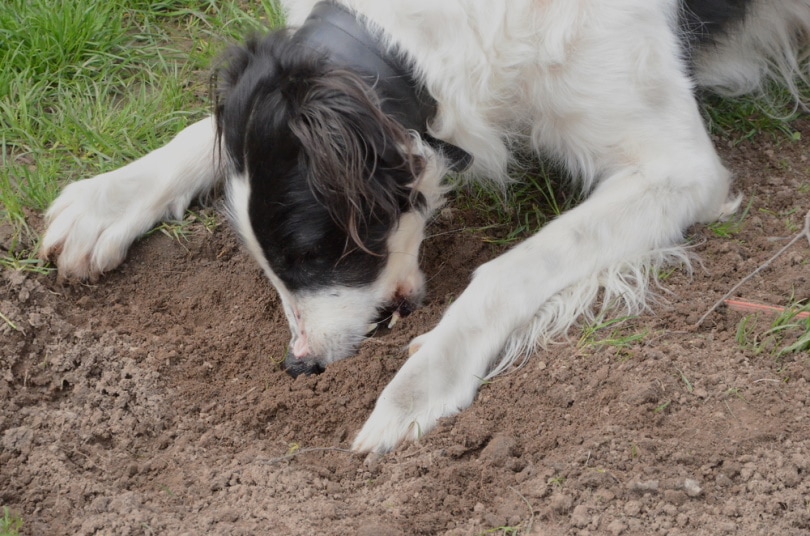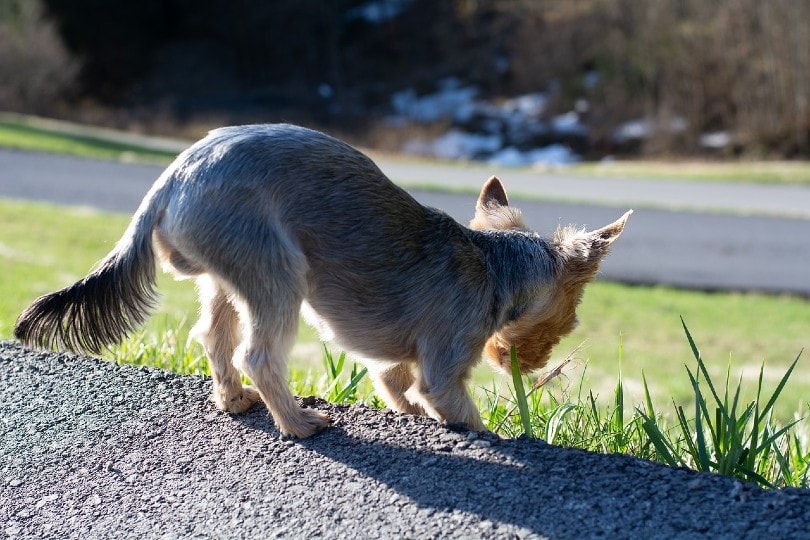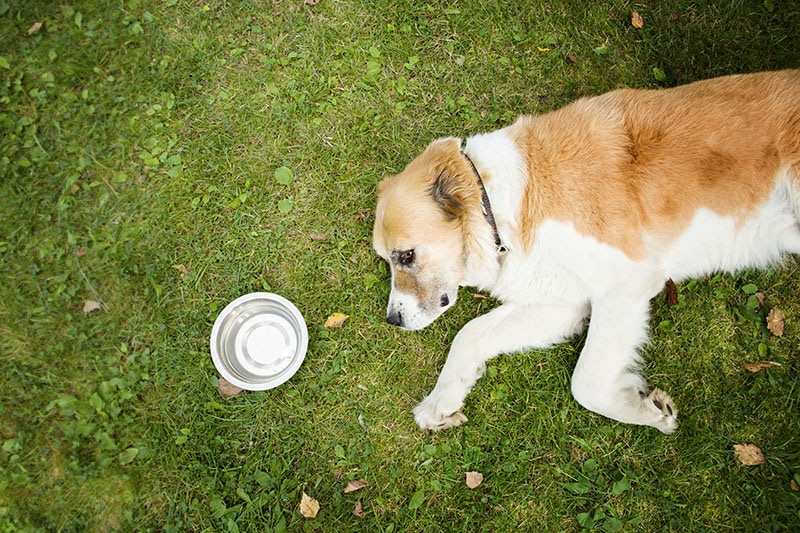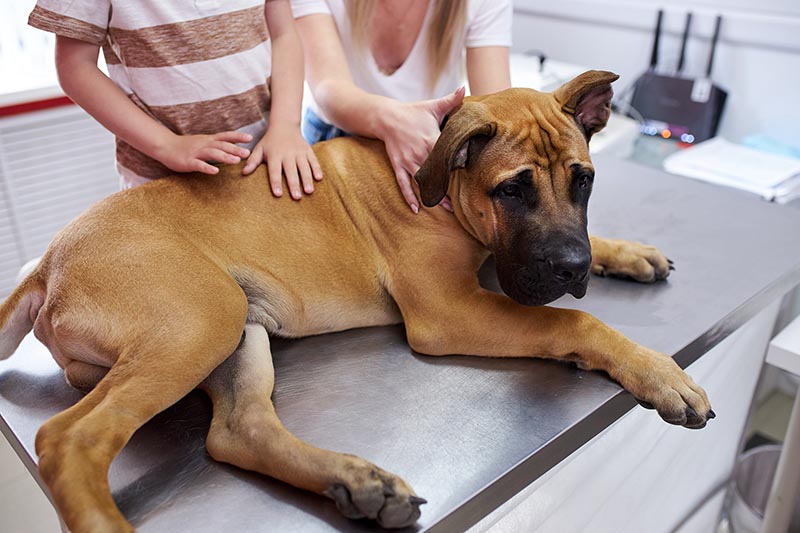
If your dog is throwing up white foam, it’s easy to start panicking, but this is likely not necessary. In most cases, dogs throw up white foam due to changes in their diet or eating grass. However, there are some more serious reasons to explain why your dog is throwing up white foam.
To ensure your dog is healthy, it’s important to determine exactly why your dog is getting sick and treat the dog accordingly. Below are the seven most common causes of a dog throwing up white foam and what to do about it:
The 7 Reasons Your Dog May Throw Up White Foam
1. Eating Something Toxic
| Severity: | Mild to serious |
| What to Do: | Call your vet |
Dogs will get into just about anything. In most cases, their curious nature is just a nuisance. Other times, dogs will eat toxins and items that are poisonous. When this happens, the dog will experience several signs, one of which could be vomiting white foam.
Believe it or not, there are tons of toxic items around your home. Chocolate, raisins, xylitol, tobacco, and antidepressants are all toxic to dogs. If your dog got into something toxic, they may be throwing up as a result.
Some other signs that point to your dog eating something toxic include diarrhea, heart issues, agitation, seizures, breathing difficulties, and lethargy. If your dog is showing these signs, it’s important to call your vet right away.
2. Eating a Foreign Object

| Severity: | Mild to serious |
| What to Do: | Call your vet |
Dogs don’t just eat items that look like food. Many get bored and will start chewing up things that have no business going into their mouths.
Because foreign objects are not designed for consumption, they often irritate your dog’s stomach. The dog will try to get rid of the foreign object by throwing up, but it doesn’t always work, resulting in white, foamy vomit.
In addition to vomiting, your dog may have abdominal tenderness, decreased appetite, difficulty going to the bathroom, lethargy, and changes in behavior. Contact your vet if you believe your dog has swallowed a foreign object.
3. Abrupt Changes in Diet
| Severity: | Mild to moderate |
| What to Do: | Slowly transition food |
Dogs have a delicate digestive system. If you change their food too quickly, they will often begin throwing up white vomit, if not their food. This doesn’t mean that the food is toxic or bad. It simply means that you changed the dog’s food too quickly.
You can prevent this from occurring by slowly transitioning your dog to the new food. For example, begin by filling up 75% of the dog’s bowl with their old food and 25% with new food. Gradually increase the new food over the week so that the dog’s digestive system has time to adjust.
If your dog still is not adjusting fast enough, you can talk to your vet about getting a probiotic as well. Probiotics will help to balance the gut flora and aid the transition.
4. Eating Grass and Other Plants

| Severity: | Mild |
| What to Do: | Nothing |
Dogs are known to eat grass and then vomit it up. Experts are not sure exactly why dogs do this. Some experts believe that dogs will eat grass whenever they’re bored or are having stomach problems. Often, dogs will throw up white vomit after eating grass and other similar plants.
More than likely, there’s nothing you need to do if your dog is eating grass and then throwing up. Only if your dog is doing this every day should you get them checked out. Take your dog to the vet if you believe their grass-eating habits are worrisome.
5. Bacterial Infection
| Severity: | Moderate to severe |
| What to Do: | Contact your vet |
So far, most of the causes for white, foamy vomit are moderate at best. Unfortunately, there are some more serious causes for your dog doing this, one of which is a bacterial infection.
Bacterial infections can include Salmonella, Leptospirosis, or Bordetella. Nearly all bacterial infections result in digestive upset, such as diarrhea and vomiting. It can also result in fever, lethargy, and changes to demeanor.
It’s important to take your dog to a vet immediately if you suspect they have a bacterial infection. Many bacterial infections can be treated with antibiotics, but not all infections are bacterial. Viruses and parasites can also cause vomiting.
6. Heat Stroke

| Severity: | Moderate to severe |
| What to Do: | Provide water, bring them inside, contact your vet |
Because dogs are covered in fur and don’t have many sweat glands, they can overheat easily. If a dog is suffering from heat stroke, they will often begin vomiting white foam. Some other signs of heat stroke include excessive drooling, red gums, diarrhea, loss of consciousness, uncoordinated movement, and collapse.
If you think your dog is overheating, it’s imperative to provide the dog with water and bring them into a cooler environment. From there, contact your vet because sometimes heat stroke results in organ dysfunction.
7. Organ Dysfunction or Disease
| Severity: | Moderate to severe |
| What to Do: | Contact your vet |
The most dangerous reason your dog may be vomiting white foam is organ dysfunction or disease. Different diseases such as bloat, pancreatitis, and kidney disease can all cause your dog to vomit up white foam frequently.
Organ dysfunction and disease will have other signs, too, but the symptoms will depend on the disease in question. If you believe your dog has any type of organ failure or disease, contact your vet immediately.
What Is White Foam Vomit?
White foam vomit doesn’t look the same as regular vomit. Instead, this vomit typically happens whenever saliva and digestive chemicals mix inside your dog’s stomach in the absence of food or bile. That is why it is mucousy and soapy-like. If the white foam vomit has a yellow-orange tint, that is a sign that bile is present as well.
How Do I Treat My Dog After Vomiting White Foam?
If your dog has thrown up white foam, it’s important to figure out the cause. Contact your veterinarian or an animal emergency hospital if you think something serious is the cause, such as ingesting a toxin or organ failure.
In the case that the vomit is just because of an upset stomach or a change in food, you don’t need to call your vet right away. Instead, allow your dog to be kept in a cool, relaxing environment. Do not feed your dog for 1-2 hours to calm their stomach and then offer a small amount of bland food.
Pay close attention to your dog’s behavior. If the behavior changes, contact your vet so that your dog can get professional help if needed.

Prevention Tips
Most dogs will vomit white foam at some point. This is unavoidable. Still, there are some things you can do to help prevent this from happening again in the near future. Here are some tips to keep in mind:
Conclusion
If your dog is throwing up white foam, one of the seven reasons above is likely to blame. Some of these causes are not very serious, whereas others can be life-threatening. It’s important to determine exactly why your dog is vomiting white foam to treat them properly.
Don’t be afraid to contact your vet during this process. Your vet will be able to provide specific recommendations and tips based on your dog’s unique needs. Plus, your vet will help to rule out any of the more serious causes.
Featured Image Credit: suchinan, Shutterstock









